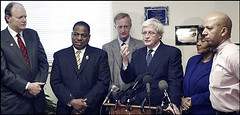Washington Post wakes up (maybe): The Lerners and the Washington Nationals
 Preston Keres/Washington Post. Press Conference about the new stadium deal. Here, (L to R) Bill Hall, Councilman Vincent Orange, Councilman Jack Evans, Mark Touhey, Councilwoman Linda Cropp, and Mayor Anthony Williams talk with media about the stadium deal.
Preston Keres/Washington Post. Press Conference about the new stadium deal. Here, (L to R) Bill Hall, Councilman Vincent Orange, Councilman Jack Evans, Mark Touhey, Councilwoman Linda Cropp, and Mayor Anthony Williams talk with media about the stadium deal.I have an exam tonight in my planning theory class, and one of the study questions is about debates in planning theory. One is over the role of planning vs. the chaos of the market (or the chaos of planning vs. the perfect information of the market).
The Lerners, the Washington Nationals, and desires to revitalize and create a destination rather than a sinkhole on the part of DC government officials and citizens are conflicting objectives. (Four examples of stadiums unsuccessful at neighborhood and commercial district development: RFK Stadium, DC; Tiger Stadium, Michigan Avenue, Detroit; the two new stadiums in Philadelphia, far away from anything but freeway; and football stadiums generally, including FedEx Field, Landover, Maryland.)
We don't study Logan and Molotch in the class, which theorists would probably think is too applied, but their discussion of "use value of place" vs. "exchange value of place" is what this comes down to.
And the city negotiated a contract, seemingly in good faith, but yielding virtually everything to the other side, putting the city in perhaps the worse position imaginable given the likelihood of delays in constructing the stadium, and the stiff financial penalties that will result.
The Post writes about this today, in "A Family That Plays Hardball," subtitled "In D.C. Stadium Negotiations and Vision for Anacostia Waterfront, City Discovers That With the Lerners, It's Always About Business."
From the article:
The family has also found itself at odds with government planners, saying their ambitious ideas often show little appreciation of economic realities. The Lerners don't talk about their work in terms of leaving a broader civic legacy. Instead, they say, they simply aspire to build successful projects, with an eye to the bottom line and the long-term security of the family. ...
John T. "Til" Hazel Jr., the prominent Northern Virginia land-use lawyer and developer, shares the Lerners' skepticism of planners and expects that view will continue to complicate the family's relations with the District.
"One thing I could have predicted was that Ted was going to do his own thing," said Hazel, who represented Lerner at Tysons. "The District is learning that Ted didn't get where he is, or become as successful as he is, by following all the rabbit holes that planners and politicians set out."
The strain has been on display since the Lerners' $450 million purchase of the team. City officials argued that the family's demand for aboveground parking garages would interfere with plans for a vibrant entertainment district around the ballpark, an anchor for the waterfront makeover. The Lerners countered that underground parking would cost too much and delay the ballpark's scheduled 2008 opening. In the face of the family's resistance, another developer's plan for garages wrapped in condominiums collapsed. Now, the city is trying to win the Lerners' backing for its latest plan, spending $75 million more in public money on a mix of above- and below-ground garages.
City officials have also said the Lerners have not participated in broader discussions about how to improve the area, which has lagged behind development in other parts of the city.
"I'm really disappointed in their involvement. They've been exclusively focused on the stadium. At best they've been indifferent and at worst hostile," said Adrian G. Washington, president and chief executive of the Anacostia Waterfront Corp., a quasi-public agency overseeing redevelopment. "The whole point of the stadium was to anchor a great waterfront neighborhood [and] create opportunities in that area. I really don't feel like they get it."
Insanity can be defined as doing the same thing over and over again, but expecting a different result. As I said a couple weeks ago, developers want the quid but not the pro quo.
Hardball indeed.

Index Keywords: stadiums-arenas; Growth-Machine



0 Comments:
Post a Comment
<< Home